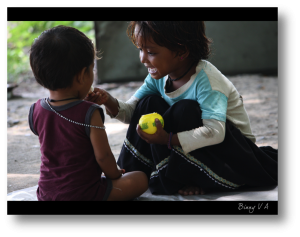Mine! Mine! Mine! – What To Do To Teach Your Child to Share
 For a little background and why kids don't share, it's worth taking a look at the "What Doesn't Work" post when teaching kids to share. Knowing what mistakes to avoid sometimes makes parents smart. Sometimes.
For a little background and why kids don't share, it's worth taking a look at the "What Doesn't Work" post when teaching kids to share. Knowing what mistakes to avoid sometimes makes parents smart. Sometimes.
For the rest of us, we like to have wisdom handed right to us, in plain view, clearly labeled, and interpreted so we don't have to think at all. We can simply do what the wise words tell us to do, and then sit back and watch the wonder of our newly gained brilliance. Or at least sleep a bit better knowing we're not totally messing up our kids. Or if our kid is already messed up, we can sleep knowing it isn't our fault, because we did exactly what the wise words said to do. So, on with the wise words for getting kids to share...
How to Encourage Sharing
Sharing is not something your child will automatically grow into. There are many selfish adults who never learned to share properly as a child. The following approaches can help you stimulate sharing in your child:
1. Allow your child to stay near the object he is sharing.
Because he can keep an eye on the item, he will be more comfortable with sharing. This also guarantees that if the other child claims possession or begins to leave the room, he can snatch back his belonging.
2. Equip your child with toys that two people can use at the same time, such as puzzles or extra large coloring books.
Playing alongside the child with whom your child is sharing with makes the whole process easier. It encourages social skills to develop and shows your child that sharing can be fun.
3. Play sharing games.
The best teacher is always example. For younger children, you can model sharing behavior through simple games. Give your toddler a stuffed animal for a few minutes and then ask for it back. Once he's comfortable with this, ask him to give you one of his stuffed animals. Hold on to it for a few seconds, keeping it in plain sight, and then give it back to him. This shows that when he gives something to you, you aren't going to keep it forever.
4. Provide alternatives.
Many times children don't share because once her toy is gone, there isn't another one available to play with. Offering her another item may distract her from the one she was playing with. At times your child will refuse whatever you present in replacement of the shared item. In such situations, it is generally a good idea to offer the other child an alternative and maintain peace with your offspring.
Don't worry if your child occasionally refuses to share. As with so many things at this age, individual instances are much less important than a general pattern. It's perfectly normal for a toddler to go through periods of intense possessiveness, especially if that child is under stress. But if a child over the age of three never shares, or treats sharing as a traumatic event, it's probably a sign of severe insecurity about what he owns, or where he fits in at school or in the family, and seeking professional help may be necessary.
It is important to remember that young children find sharing difficult and confusing. Some days your child will happily share everything she owns, and other days she will adamantly refuse to share anything. For your child, that's all a part of growing up and understanding the world. Through your patience and encouragement, your child will share.
Learn more about common parenting problems here.
Reference
Kutner, L. (1994). Toddlers and preschoolers. New York: William Morrow and Company.
 RSS Feed
RSS Feed